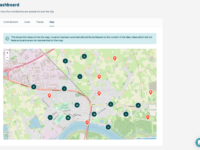Citizens Connect is a civic tool that provides access to information and public services, to support effective service delivery by gathering feedback and highlighting issues which are of concern to Citizens to the relevant Government agency for timely resolution. The platform also serves as a portal for civic awareness, public service information, citizen reporting, inquiries, and advice. This initiative fosters accountability and transparency in public services.
Innovation Tag Opengov: engagement
The promotion of competition has been identified as one of the major challenges of the Public Procurement System in Colombia. Despite its importance, it was only in 2019 that a tool allowing to effectively monitor the participation of the interested parties on the bidding processes was developed and implemented by the Colombian Procurement Agency. Thanks to this tool, participants are able to diagnose flaws, and make suggestions or requests for improvements.
In England, provision of and funding for adult social care has been subject to numerous reports, commissions and Government papers which have failed to produce agreement on how to tackle the urgent need for reform.
Involve was commissioned by two UK Parliamentary Committees to run a citizens’ assembly – a representative sample of the English public – to inform their joint inquiry on the issue.
It was the first time a UK Parliament has ever run a citizens' assembly to gather public views.
The project of monitoring open government commitments was developed with the objective of guaranteeing the fulfillment of the Brazilian initiatives in the scope of the Open Government Partnership. It is a process carried out jointly, periodically and proactively by government and civil society, with significant results for society as a whole. This approach is materialized through specific monitoring and evaluation actions that provide transparency regarding the implementation of Brazilian OGP…
It is currently difficult for the public to follow how EU laws are made. This is because the Council - where Member States are represented - remains relatively inaccessible. Documents are difficult to get hold of and Member States’ positions on a given law are not public. The EO opened an own-initiative inquiry into Council legislative transparency and has called for a series of transparency steps to be taken.
En 2015, le Parlement de Wallonie a engagé une réforme de son Règlement ayant notamment pour objectif d’associer davantage les citoyens wallons au travail législatif des députés.
Dans ce cadre, plusieurs dispositifs ont été mis en place dont la plateforme "Un décret par tous, un décret pour tous" qui vise à encourager les citoyens à intervenir directement dans la rédaction d’un décret sur base d’une problématique soulevée par un député.
Open policy-making is an opportunity for government and stakeholders to move from linear, polarized, single-issue, interest-based considerations to interactions that are networked, collaborative, opportunity-based and where complexity is viewed as an asset. Adapted for the Government of Canada context, Pol.is is a cost-effective and highly scalable, digital engagement platform that can be used as part of broader strategies to put people and robust evidence at the heart of government decisions.
The Administration of Rome had to decide how to use about 17 million euros for public works in the territory of the VIII District for projects concerning the environment, landscape and public green spaces, sustainable mobility and accessibility, urban regeneration and infrastructure, ideas or proposals for transversal projects. The innovation concerns the decision-making approach. For the first time, city users were involved in deciding how to allocate these resources.
Case Study
Unlocking the potential of crowdsourcing for public decision-making with artificial intelligence

In citizen participation projects, analysing contributions is often a huge challenge for administrations.
CitizenLab has developed machine-learning algorithms in order to help civil servants easily process thousands of citizen contributions and efficiently use these insights in decision-making.
The dashboards on our platform classify ideas, show what topics are emerging, summarise trends and cluster similar contributions by theme, demographic trait or location.
Les Halles Civiques is a third-place network that gathers organisations working on citizen empowerment, public innovation, and democratic progress. Its members are researchers, designers, social innovators, entrepreneurs, etc. It aims to contribute to a richer and more inventive democratic life at the local, national and international level, and strengthen democratic innovation. It is also a physical space where citizens, professionals and representatives can work, meet and discuss.

